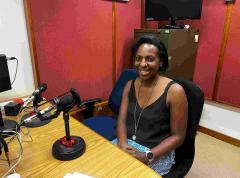简介
Listen to #Hashtag Hong Kong every Sunday morning at 8.15
Focussing on issues affecting civil society, we'll hear from representatives of NGOs, associations, statutory bodies, and non-profit groups.
(Sundays 8.15am - 8.25am)
最新

Kay McARDLE, Director & Founding Member of Equal Justice
As most will know, the law can be complicated, confusing and costly. In Hong Kong, 1.394 million people live at or below the poverty line and that population cannot afford to pay private lawyers’ fees.
We know from the Department of Justice’s 2008 consultancy study on the “Demand for and Supply of Legal and Related Services” that 79% of people in Hong Kong did not know what to do when faced with a legal problem and that 40% of respondents for that survey had a legal problem. Using these numbers, we estimate that the pool of disadvantaged people with a legal problem is 550,000, or thereabouts, and, of those, some 440,000 do not know where to go for help.
And so the fact is that, for HK’s poorest people, the most disadvantaged people, there is a legal access gap. The people we serve are underprivileged and are often also very vulnerable. Typical legal problems include things like family matters, employment and discrimination, education, housing, immigration, criminal matters and sometimes, personal injury, healthcare, probate and of course increasingly online scams.
They extraordinary people face significant disadvantages due to a confluence of factors: the complexity of the legal system, a lack of financial resources and education, cultural and gender access to justice barriers as well as an absence of legal and digital literacy. Language barriers can actually be a major barrier. Limited financial resources restrict people’s access to private legal representation. Lack of education and awareness about their rights further exacerbates the issue they face, making them vulnerable to exploitation and unfair treatment. There are also some systemic biases within the legal system can also disproportionately affect marginalised communities.
The government services and clinics may not always provide interpreters to non-Cantonese or non-English-speaking people, which can really complicate access to information, advice and/or representation. There are also Cultural stigmas around legal action, particularly in family or employment disputes, which can make individuals not seek help early enough, which means there is an over reliance on informal networks rather than the formal legal channels. And all these mean that even if the legal problem is settled for now, the outcome is not legally enforceable and it means thee can be even more problems further down the line. Overcoming these barriers requires comprehensive legal aid, community outreach, and also we would hope for some systemic reforms to ensure equal access to justice.
Hong Kong has limited publicly funded community legal information and advice centres. While the Department of Justice, the legal professional bodies, the Duty Lawyer Service and the Legal Aid Department provide some support, this does not cover all cases. In fact, it also only addresses cases once a person is able to identified and not everyone knows that the problem they have has a legal solution, let alone being able to name it and even to work out what to do about it.
Equal Justice fills this initial void by offering assistance in the early problem identification phases, helping with settlement to avoid stressful and costly court proceedings, linking disadvantaged people to lawyers and helping them throughout their case journey so they are supported, can understand what is going on and can navigate the system well enough to make informed decisions. And why? To ensure that they avoid any further hardship and specifically poverty.
We provide legal first aid - to disadvantaged people - who cannot afford or otherwise access the law and legal support. We empower people and communities with legal education, information, and support, to ensure that justice isn’t just a privilege for the wealthy and well-connected. We give free, face-to-face, tailored legal information and support, and and also refer cases to lawyers and counsellors. So far, we have worked on 3,000 cases, and we’re just 5 years old. Ad the people we help are 50% women, 30% children and 20% men.
When it comes to generalised legal support for Hong Kong’s disadvantaged population, organisations like Equal Justice and university clinics rely heavily on pro bono lawyers. But, demand often outstrips supply, especially for time-intensive cases like child abuse or neglect, intimate partner violence, discrimination and family disputes.
We have partnerships with 100+ amazing law firms and 54+ charities are robust but may not be able to scale given the widespread needs that we are already experienced. And our caseload has increased ~40% each year for the last 3 years, which is quite significant.
In March 2025, rather wonderfully, the HK Bar Association announced that they will be partnering with Equal Justice and 3 other NGOs more closely to bridge the community legal access gap. This is a very welcome endorsement.






















